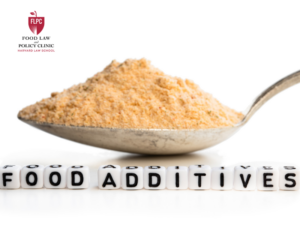By Jennifer Weeks, FLPC Student, Fall 2024
The Food Safety and Inspection Service (FSIS) is a division of the United States Department of Agriculture (USDA) with the critical job of ensuring the safety of meat, poultry, and egg products in the U.S. While FSIS has laid out comprehensive regulations that both establish safety in the supply chain and protect consumers who purchase meat, poultry, and egg products, its regulations do not include any food donation-specific safety requirements. This silence on food donations creates confusion and concerns around liability for donated foods and unfortunately prevents many potential food donors and recovery organizations from donating or accepting safe and wholesome meat, poultry, or egg products.
In its efforts to encourage food donations, FSIS created the Guideline to Assist with the Donation of Eligible Meat, Poultry & Egg Products to Non-Profit Organizations. In 2021, The Food Law and Policy Clinic (FLPC) at Harvard Law School submitted comments on the 2020 Guideline recommending that FSIS further clarify what foods can be donated and provide information to reduce donor liability concerns. Then, in May 2024, FSIS released a revised Guideline to reflect stakeholder comments on the previous version, incorporate current science, and improve readability. Though it has some room to be further strengthened, the 2024 revised Guideline provides critical information that will increase organizations’ confidence in donating safe, nutritious food, helping improve food security and access while reducing food waste.
The 2024 Guideline successfully clarified that most meat, poultry, and egg products are eligible for donation unless they are experimental products or adulterated (other than economically adulterated). Adulterated here means foods have been changed by adding or removing components that impact the quality or safety of the food. In contrast, economically adulterated food refers to food that is still safe to consume but has been mislabeled to increase profit (by, for example, substituting cheaper ingredients or misrepresenting quantity). Specific FLPC feedback was successfully implemented in a few areas including the donation flowchart, which was updated with more information on non-federally inspected foods acceptable for interstate and intrastate donation and redesigned to improve readability.
Also, a new section was created at the beginning of the guideline highlighting the Bill Emerson Good Samaritan Act. This act offers broad liability protection to incentivize food donations. Awareness of this act helps reduce the liability fears of organizations donating and receiving food. The new guidelines also clarified acceptable donation recipients by removing a non-exhaustive list of potential donation destinations. The prior version of the guideline specifically identified schools and non-profit fundraisers as potential destinations for food donations, which could have been misinterpreted as restricting donations to other organizations like food banks. The above changes will reduce organizations’ liability concerns and increase their confidence in donating.
Even with all these useful updates, there are still more ways to strengthen the FSIS guidance. For example, the guidance on custom slaughtering and game meat is still insufficient. The current guidelines indicate that custom and game meat are ineligible for donation. However, most custom slaughtering is regulated by states, rather than the federal government. FLPC recommended adding information directing potential donors, such as custom slaughter facilities, to check with local and state regulations and authorities for information about donating these products. Also, game meat is under the FDA’s jurisdiction, so the guidelines should specify that game meat must meet FDA regulations on top of state and local regulations. Future iterations should incorporate this level of information to clarify regulatory jurisdiction and reduce confusion about the donation of custom slaughtered and game meat.
Overall, FLPC applauds the new FSIS guideline and the effort to facilitate increased food donations. Although FLPC continues to recommend clarification of where to seek guidance for custom-slaughtered and game meat donations, the revised guideline successfully clarifies that most meat, poultry, and egg products are eligible for donation unless they are unsafe due to adulteration (other than economic adulteration) or are experimental products. Additionally, including the Bill Emerson Good Samaritan Act at the outset of the guideline helps mitigate liability concerns. The updated FSIS guideline offers additional clarity and information related to food donation safety and liability protections that will make it easier for food businesses to donate and non-profit organizations to distribute safe, wholesome meat, poultry, and egg products ultimately reducing the waste of nutritious food.


Food Law & Policy, Commentary
Policy to Reduce Methane Emissions and Feed More People
April 3, 2025